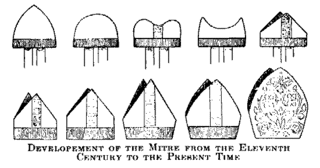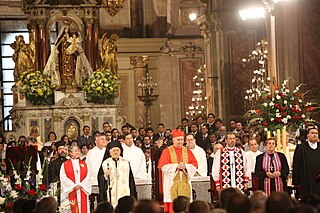
The Christian Church is a Mainline Protestant Christian denomination in the United States and Canada. The denomination started with the Restoration Movement during the Second Great Awakening, first existing during the 19th century as a loose association of churches working towards Christian unity, then slowly forming quasi-denominational structures through missionary societies, regional associations, and an international convention. In 1968, the Disciples of Christ officially adopted a denominational structure at which time a group of churches left to remain nondenominational.

An episcopal polity is a hierarchical form of church governance in which the chief local authorities are called bishops. It is the structure used by many of the major Christian Churches and denominations, such as the Catholic, Eastern Orthodox, Oriental Orthodox, Church of the East, Anglican, and Lutheran churches or denominations, and other churches founded independently from these lineages.

The World Council of Churches (WCC) is a worldwide Christian inter-church organization founded in 1948 to work for the cause of ecumenism. Its full members today include the Assyrian Church of the East, the Oriental Orthodox Churches, most jurisdictions of the Eastern Orthodox Church, the Old Catholic Church, the Lutheran Churches, the Anglican Communion, the Mennonite Churches, the Methodist Churches, the Moravian Church and the Reformed Churches, as well as the Baptist Churches and Pentecostal Churches. Notably, the Catholic Church is not a full member, although it sends delegates to meetings who have observer status. The WCC arose out of the ecumenical movement and has as its basis the following statement:
The World Council of Churches is a fellowship of churches which confess the Lord Jesus Christ as God and Savior according to the scriptures, and therefore seek to fulfill together their common calling to the glory of the one God: Father, Son and Holy Spirit.
It is a community of churches on the way to visible unity in one faith and one eucharistic fellowship, expressed in worship and in common life in Christ. It seeks to advance towards this unity, as Jesus prayed for his followers, "so that the world may believe".
Full communion is a communion or relationship of full agreement among different Christian denominations that share certain essential principles of Christian theology. Views vary among denominations on exactly what constitutes full communion, but typically when two or more denominations are in full communion it enables services and celebrations, such as the Eucharist, to be shared among congregants or clergy of any of them with the full approval of each.

Ecumenism, also spelled oecumenism, is the concept and principle in which Christians who belong to different Christian denominations work together to develop closer relationships among their churches and promote Christian unity. The adjective ecumenical is thus applied to any interdenominational initiative that encourages greater cooperation between Christians and their churches.

The World Evangelical Alliance (WEA) is a global organization of evangelical Christian churches, serving more than 600 million evangelicals, founded in 1846 in London, England, United Kingdom to unite evangelicals worldwide. WEA is the largest international organization of evangelical churches. The headquarters are in Deerfield, Illinois, with UN offices in New York City, Geneva, and Bonn. It brings together 7 regional and 129 evangelical alliances of churches, and over 150 member organizations. Some of the national alliances include Protestant churches which are not traditional Evangelical churches in the strict sense (anabaptism). Moreover, the WEA includes a certain percentage of individual evangelical Christian churches. Effective March 2021, new Secretary General of the WEA is the German theologian Thomas Schirrmacher.

The Church of North India (CNI), the dominant united Protestant Church in northern India, was established on 29 November 1970 by bringing together the Protestant churches working in northern India; it is thus a province of the worldwide Anglican Communion and member of the World Methodist Council, as well as the World Communion of Reformed Churches. The merger, which had been in discussions since 1929, came eventually between the Church of India, Pakistan, Burma and Ceylon (Anglican), the United Church of Northern India,, the Baptist Churches of Northern India, the Church of the Brethren in India, which withdrew in 2006, the Methodist Church and the Disciples of Christ denominations.
The Reformed Ecumenical Council (REC) was an international organization of Calvinist Churches. It had 39 member denominations from 25 countries in its membership, and those churches have about 12 million people together. It was founded August 14, 1946 in Grand Rapids, Michigan as the Reformed Ecumenical Synod. The Reformed Ecumenical Council was the second largest international Reformed alliance and the more conservative of the two largest. In 1953, The Reformed Ecumenical Synod meeting in Edinburgh decided to advise its member churches not to join the World Council of Churches as currently constituted because it “permits essentially different interpretations of its doctrinal basis, and thus the nature of the Christian faith” and “represents itself as a Community of faith, but is actually not this” due to member churches holding “basically divergent positions.” About two-thirds of REC member churches also belonged to the larger World Alliance of Reformed Churches (WARC). The seat of the Reformed Ecumenical Council was Grand Rapids, Michigan, United States.

The World Methodist Council (WMC), founded in 1881, is a consultative body and association of churches in the Methodist tradition. It comprises 80 member denominations in 138 countries which together represent an estimated 80 million people; this includes approximately 60 million committed members and a further 20 million adherents.

The Joint Declaration on the Doctrine of Justification (JDDJ) is a document created and agreed to by the Catholic Church's Pontifical Council for Promoting Christian Unity (PCPCU) and the Lutheran World Federation in 1999 as a result of extensive ecumenical dialogue. It states that the churches now share "a common understanding of our justification by God's grace through faith in Christ." To the parties involved, this essentially resolves the 500-year-old conflict over the nature of justification which was at the root of the Protestant Reformation. The World Methodist Council adopted the Declaration on 18 July 2006. The World Communion of Reformed Churches, adopted the Declaration in 2017.

The Anglican Consultative Council (ACC) is one of the four "Instruments of Communion" of the Anglican Communion. It was created by a resolution of the 1968 Lambeth Conference. The council, which includes Anglican bishops, other clergy, and laity, meets every two or three years in different parts of the world.
Churches Together in Britain and Ireland (CTBI) is an ecumenical organisation. The members include most of the major churches in England, Scotland, Wales and Ireland. CTBI is registered at Companies House with number 05661787. Its office is in Central London; As of 2015 the General Secretary was Canon Bob Fyffe.

The Catholic Church has engaged in the modern ecumenical movement especially since the Second Vatican Council (1962-1965) and the issuing of the decree Unitatis redintegratio and the declaration Dignitatis humanae. It was at the Council that the Pontifical Council for Promoting Christian Unity was created. Before that time, those outside of the Catholic Church were categorised as heretics or schismatics.

The World Communion of Reformed Churches (WCRC) is the largest association of Reformed churches in the world. It has 233 member denominations in 110 countries, together claiming 100 million people, thus being the third largest Christian communion in the world after the Roman Catholic Church and the Eastern Orthodox Church. This ecumenical Christian body was formed in June 2010 by the union of the World Alliance of Reformed Churches (WARC) and the Reformed Ecumenical Council (REC).
The Pontifical Council for Promoting Christian Unity (PCPCU) is a pontifical council whose origins are associated with the Second Vatican Council which met intermittently from 1962 to 1965.

The United Church of Christ in the Philippines is a Christian denomination in the Philippines. Established in its present form in Malate, Manila, it resulted from the merger of the Evangelical Church of the Philippines, the Philippine Methodist Church, the Disciples of Christ, the United Evangelical Church and several independent congregations.
The Ecumenical Centre in Geneva, Switzerland, is located in the vicinity of the International Labour Organization, International Red Cross and Red Crescent Movement, and the World Health Organization and serves as the base for the following Church organizations:
Fraternal delegates are official delegates, who attend major assemblies of a friendly body as a formal expression of the fraternal bonds.

Christopher Mackie Ferguson is a pastor, theologian and social justice advocate from the United Church of Canada. He was elected to the post of general secretary of the World Communion of Reformed Churches in May 2014. He entered office on 1 August 2014, for a seven-year term.












